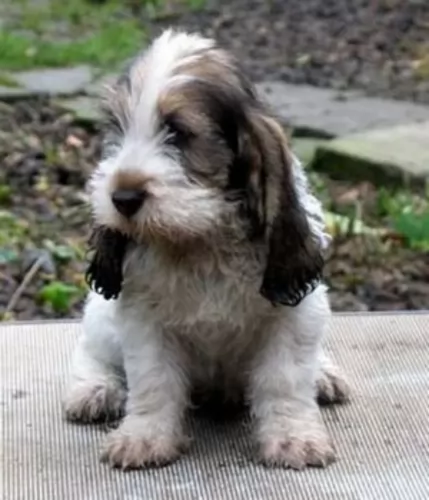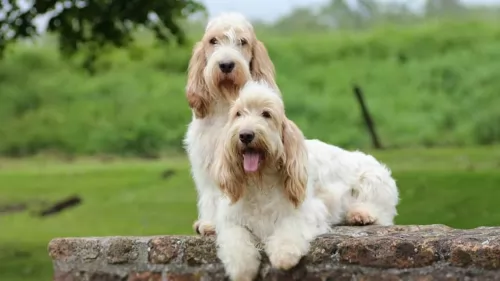 Petzlover
Petzlover Petit Basset Griffon Vendeen is originated from France but Mucuchies is originated from Venezuela. Petit Basset Griffon Vendeen may grow 31 cm / 12 inches shorter than Mucuchies. Petit Basset Griffon Vendeen may weigh 41 kg / 90 pounds lesser than Mucuchies. Both Petit Basset Griffon Vendeen and Mucuchies has almost same life span. Both Petit Basset Griffon Vendeen and Mucuchies has almost same litter size. Petit Basset Griffon Vendeen requires Moderate Maintenance. But Mucuchies requires Low Maintenance
Petit Basset Griffon Vendeen is originated from France but Mucuchies is originated from Venezuela. Petit Basset Griffon Vendeen may grow 31 cm / 12 inches shorter than Mucuchies. Petit Basset Griffon Vendeen may weigh 41 kg / 90 pounds lesser than Mucuchies. Both Petit Basset Griffon Vendeen and Mucuchies has almost same life span. Both Petit Basset Griffon Vendeen and Mucuchies has almost same litter size. Petit Basset Griffon Vendeen requires Moderate Maintenance. But Mucuchies requires Low Maintenance
 The Petit Basset Griffon Vendéen hails from France. They have always been used to hunt game by scent. This dog has always been appreciated for its independence and the fact that is is mentally focused and fit.
The Petit Basset Griffon Vendéen hails from France. They have always been used to hunt game by scent. This dog has always been appreciated for its independence and the fact that is is mentally focused and fit.
These dogs, referred to as the PBGV descend from the larger Griffon Vendeen, which comes in four distinct sizes. The first official French standard for this dog was published in 1898. It was in 1909 that a revised standard for the dog recognized two distinct varieties.
The first PBGVs were imported to the United States in 1983 and the Petit Basset Griffon Vendeen Club of America was founded in 1984.
 The Mucuchies are a breed born in the Venezuelan mountains, in the late 1700s. They are rare today but were popular in the mountains for hundreds of years. They are believed to be a cross between the dogs brought by the Spanish Conquistadors in the 14th and 15th centuries and the local dogs. However, by the 1960s this rare breed was close to extinction.
The Mucuchies are a breed born in the Venezuelan mountains, in the late 1700s. They are rare today but were popular in the mountains for hundreds of years. They are believed to be a cross between the dogs brought by the Spanish Conquistadors in the 14th and 15th centuries and the local dogs. However, by the 1960s this rare breed was close to extinction.
Bred primarily as herders and watchdogs, their ancestry likely included the Algerian Mastiff, the Spanish Mastiff, the Great Pyrenees, and the Atlas Shepherd, otherwise known as the Aidi. The early development of the Mucuchies is attributed to Wilender Ferrari, DVM. At the time, Simon Boliva was fighting for Venezuelan independence in the city of Mucuchies. He adopted a member of the breed and named it for the city. The name stuck as the name for the breed.
Later in this timeframe, the Mucuchies was crossbred with the Pyrenean Mastiffs that friars brought to the Andes from their monasteries. With them, they also brought the sheep for the dogs to herd and guard. During the 1920s the breed spread throughout the country, but by the beginning of the 1960s there was a major decline in the breed. This was partly due to changes in culture and lifestyle in the Andes.
In 1961 a Mucuchies club was formed for the breed preservation and the breed was formally named the National Dog of Venezuela. The club was disbanded in the mid-1960’s and this led the breed to the edge of extinction. By 2008 there was another major push to save the breed. This effort came from the government who wanted to preserve the breed. In 2008, they created the Fundacion Nevado and sent six Mucuchies to the Waraira Repano Cable Car System in the El Avila National Park so that the dogs would be in a climatic environment as similar to the Andes mountain as possible. This was successful and the program was increased by Venezuelan President Hugo Chavez.
As the breed continued to develop the shepherding instincts were lost and the guarding aspects were strengthened. This left today’s Mucuchies as a breed of gentle, active dogs with strong characters and a loving disposition. They are gentle with their families but protective and aggressive with strangers. They are the only native breed of Venezuela and currently, there are programs in the mountains to re-establish and strengthen them.
In addition to their name for the town of Mucuchie, the breed is also called the Paramo’s Dog or the Snowy. These programs exist because in Venezuela they are near extinction once again. This is the result of inbreeding and more cross-breeding, this time with larger dogs like St. Bernards. Thus, the continued efforts by the Nevado Foundation with the assistance of the government to restore the original Mucuchies breed to Venezuela.
 Both male and female dogs are much the same in size, standing at between 32 and 40cm and weighing between 15 to 20 kilograms.
Both male and female dogs are much the same in size, standing at between 32 and 40cm and weighing between 15 to 20 kilograms.
These are solid dogs with fairly short legs and a harsh double coat that is medium length and rough. The coloring is essentially white with patches of orange, lemon, tan or black. The dog has a general tousled appearance with quite a bit of hair around the face. The ears are set low and are floppy while the tail is medium length and held high.
The Petit Basset Griffon Vendeen is a friendly, social, outgoing dog that is good with children and other dogs. He is stubborn and should be trained and socialized so that he is well mannered around people and so that he also obeys simple commands.
They are quite noisy dogs, ‘talking’ to other dogs with a howl and bark.
 The appearance of the Mucuchies is that of a breed of large dogs who stand two feet at the shoulder and can weight one hundred pounds. They have a deep chest, heads that are wedge-shaped and skulls shaped like domes. Their muzzles are straight, and their nostrils are large on their black nose. The Mucuchies have dark eye and eyelids along with ears that are triangular in shape and medium in size. Their lips are black but this and he has a well-developed ruff.
The appearance of the Mucuchies is that of a breed of large dogs who stand two feet at the shoulder and can weight one hundred pounds. They have a deep chest, heads that are wedge-shaped and skulls shaped like domes. Their muzzles are straight, and their nostrils are large on their black nose. The Mucuchies have dark eye and eyelids along with ears that are triangular in shape and medium in size. Their lips are black but this and he has a well-developed ruff.
They are large, sturdy dogs with a grand appearance and tremendous energy. Their neck is strong, short and very muscular with wide shoulders and a straight back. The tail is much longer than their hocks and it is shaped like a fan and he raises it when he is alerted. They have a short, thick coat and most are white or white with gray, honey or black. This is a very attractive breed.
 The Petit Basset Griffon Vendéen is known for his amicable characteristics. They’re also intelligent, curious dogs and will respond well to training and socialization.
The Petit Basset Griffon Vendéen is known for his amicable characteristics. They’re also intelligent, curious dogs and will respond well to training and socialization.
Apart from getting on well with children in the home, they also get on well with other dogs. They’re independent and strong willed and can be inclined to bark a bit to make himself known. It is why he is best suited to a home in the suburbs or countryside where his barking won’t disturb close-living neighbors, although training and socialization should change this habit. With training, this dog can become a most wonderful friend and pet.
 Good with children and very good with their own families. Might be a little standoffish with others.
Good with children and very good with their own families. Might be a little standoffish with others.
They no longer have the strong herding instinct but are outstanding guard dogs.
Yes but need land to run in. Don’t put this giant dog in an apartment. You will both be miserable.
Very intelligent and their ability and willingness to learn is very good.
 Average longevity of these dogs is about 12, 13, or 14 years if he gets looked after well.
Average longevity of these dogs is about 12, 13, or 14 years if he gets looked after well.
Eyes and joints are always a problem with the Petit and several of the eye diseases dogs get can actually lead to blindness.
Corneal wounds are fairly common in dogs. The cornea can be injured and lacerations can damage the eye. You’ll see your pet rubbing at the affected eye.
Hip joints can cause lameness and pain. Dogs can develop hip and joint problems at any age. Joint problems can be better eliminated by providing the dog with good nutrition and exercise. If your dog is obese, joint problems can be more severe. Weight loss can reduce the signs of joint pain in dogs.
 Because of their rarity and somewhat isolation, they do not have many genetic health concerns. They do however face at least a couple of the issues that most large dogs face.
Because of their rarity and somewhat isolation, they do not have many genetic health concerns. They do however face at least a couple of the issues that most large dogs face.
This can be a serious issue for such a large dog. It can cause arthritis and lameness.
This might be the biggest threat to the Mucuchies’ health. They are big dogs and if they injury limbs it can be quite serious.
The distension or inversion of the stomach and intestines is potentially fatal and must be treated immediately. Large dogs are prone to bloat and feeding schedules can go a long way in preventing it.
 These are active dogs and they will like a daily walk to burn off some of their excess energy. They can adapt to living in the city or the countryside but they will certainly need to receive exercise wherever they are. Buy him some toys and a ball and throw it for him – this can be a wonderful form of exercise for your 4-legged friend.
These are active dogs and they will like a daily walk to burn off some of their excess energy. They can adapt to living in the city or the countryside but they will certainly need to receive exercise wherever they are. Buy him some toys and a ball and throw it for him – this can be a wonderful form of exercise for your 4-legged friend.
They need to be brushed at least twice a week to avoid matting and tangles. Some people opt to have the coat stripped. This is either done by hand or with a special stripping tool. Some dog owners prefer to hand the dog in for a professional cut, but this can alter the texture of the coat.
Because of the floppy ears, they will need regular ear cleanings to prevent ear infections brought about by dirt, wax and moisture within the ear.
He will also need to have his paw nails clipped. He can’t tell you about aching teeth, so do your canine friend a favor and check inside his mouth to ensure that all his teeth are still in tip top condition. Bad teeth can cause all kinds of illnesses and even affect the heart and kidneys.
The nutritional needs of your Petit Basset Griffon Vendeen are very important if your want your pet to enjoy good health.
Vitamins and minerals are an essential part of his nutrition, and luckily the top quality commercially manufactured dog foods see to it that the food has essential nutrients in them. With the best ones, your pet can expect a balanced diet.
Try and avoid the lower quality foods as these have toxic fillers and unhealthy ingredients in them that can make your pet sick.
Give him some home-made food too. You can chop this food up and mix it into his kibble occasionally to give him a healthy tasty treat. The best thing about dogs as pets is that they love their food to be simple and nutritious. Boiled chicken, brown rice or pasta and some healthy vegetables such as spinach, carrots and sweet potato will do him the world of good.
If you can, a little bit of raw meat from time to time can also be excellent for him. Make sure he is never without a bowl of fresh, cool water.
 As mentioned in health concerns, feeding appropriately is critical to the Mucuchies’ health. Puppies need a high quality, large breed dry food 2-3 times per day at ½ cup each time. Don’t overfeed. Don’t exercise before or after eating to prevent bloat.
As mentioned in health concerns, feeding appropriately is critical to the Mucuchies’ health. Puppies need a high quality, large breed dry food 2-3 times per day at ½ cup each time. Don’t overfeed. Don’t exercise before or after eating to prevent bloat.
The adult Mucuchies should eat at least twice a day for a total of two and one-half cups. So, you might feed one and ¼ cup at each meal. Again, it is critically important that you don’t overfeed. Don’t feed before or after strenuous exercise and don’t let your Mucuchies eat too quickly in order to avoid bloat.
This is a large dog with generally very good health. His stamina and heart will impress you.
The Mucuchies is not an active inside dog, but he is a large dog that needs daily exercise. They need to be able to run or at least to trot. A large yard or dog bark is necessary. However, this big, double coated dog hates the hot weather and needs a cooler climate. Winter is fine with him. Don’t overwork them while they are growing. Walks are the best exercise for this breed.